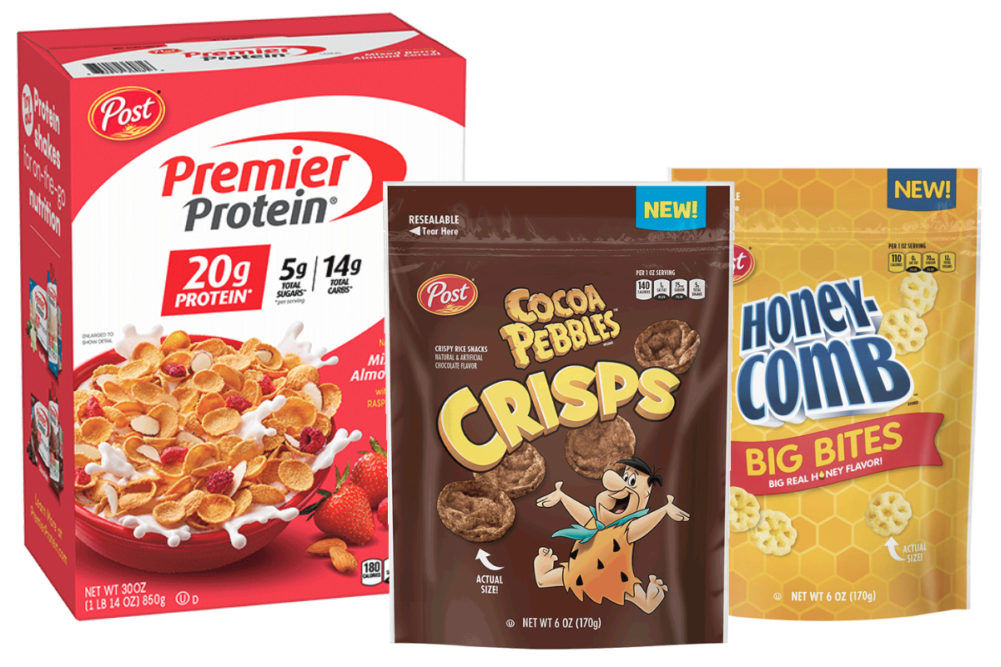ST. LOUIS — Post Holdings, Inc. is “cautiously optimistic” that two of its efforts to uncover more fundamental cereal category innovation may come to fruition, said Robert V. Vitale, president and chief executive officer of the St. Louis-based company.
“Premier Protein cereal has launched with great success at limited distribution,” Mr. Vitale said during a Feb. 5 conference call with analysts to discuss first-quarter results. “This launch combines our heritage strength in cereal with our competence in protein and, we believe, delivers great-tasting cereal with high protein.
“Second, we have launched snacking products, which leverage our iconic brands into more rapidly growing dayparts.”
The new snacking products include Cocoa Pebbles Crisps, Fruity Pebbles Crisps, Honeycomb Big Bites and Chocolate Honeycomb Big Bites. The snacks feature the same flavors as their breakfast cereal counterparts but come in larger, more portable and snackable forms.
Overall, Mr. Vitale said Post turned in a solid quarter within its US cereal business despite being hampered by supply constraints.
“During November and December, our COVID absenteeism at our Battle Creek (Mich.) facility required us to temporarily suspend production for one building,” he said. “In fact, this resulted in a highly publicized Grape Nuts shortage. Production was also suppressed on Honeycomb and peanut butter products. We are back to full production, but it will take through early spring to restore inventory levels. We estimate the first-quarter impact was a loss in revenue and adjusted EBITDA of approximately $10 million and $6 million, respectively.
“Longer term, COVID has revealed some areas in which we can improve supply chain effectiveness and efficiency. The demand surges and the supply pressures are testing our demand planning and production planning. These learnings are constructive, and we expect to emerge from COVID with improved processes. While most pronounced at Post Consumer Brands, supply chains across the company are learning and improving from the experience.”
Net income at Post Holdings, Inc. in the first quarter ended Dec. 31, 2020, totaled $81.2 million, equal to $1.24 per share on the common stock, down 18% from $99.2 million, or $1.40 per share, in the same period a year ago. Net sales were narrowly lower, slipping to $1.458 billion from $1.457 billion a year ago.
Segment profit in the Post Consumer Brands unit was $70.5 million in the first quarter, down 13% from $80.6 million, while sales increased to $445 million from $441.2 million. Segment profit for the first quarter of 2021 was negatively impacted by a provision of $15 million for a legal settlement, which was treated as an adjustment for non-GAAP measures. Post said volumes were flat as growth in Post branded cereals was offset by declines in private label and government bid business (primarily resulting from the decision to exit certain low-margin business), licensed brand cereal and Malt-O-Meal bag cereal.
Operating profit in the Foodservice business unit fell 77% to $10.8 million from $47 million, while sales decreased 16% to $354.5 million from $420.6 million. Volumes for the first quarter decreased 20%, driven by lower away-from-home demand in reaction to the COVID-19 pandemic in various channels, including full-service restaurants, quick-service restaurants, education and travel and lodging.
Post’s Refrigerated Retail business unit, which includes side dishes, egg, cheese and sausage products, had operating profit of $33.7 million in the first quarter, up 30% from $26 million in the same period a year ago. Sales of $263.1 million were up 5% from $249.9 million the previous year.
“The Bob Evans side dish business continues its rapid growth by increasing consumption dollars 21% over last year,” Mr. Vitale said. “Volume grew a healthy 11%. Our retail branded egg business also turned in a solid quarter, with volumes increasing 13%. The weak spot remains our cheese business. In addition to commodity price volatility, production delays from a co-packer resulted in lost sales volume.”
Operating profit in the Weetabix unit increased 19% to $28.1 million from $23.7 million, while sales rose 12% to $113.5 million from $101.5 million.
Operating profit in the BellRing Brands business, which includes ready-to-drink protein shakes, beverages, powders and nutrition bars, fell 3% to $47.8 million from $49.3 million. Sales, meanwhile, rose 16% to $282.4 million from $244 million.






